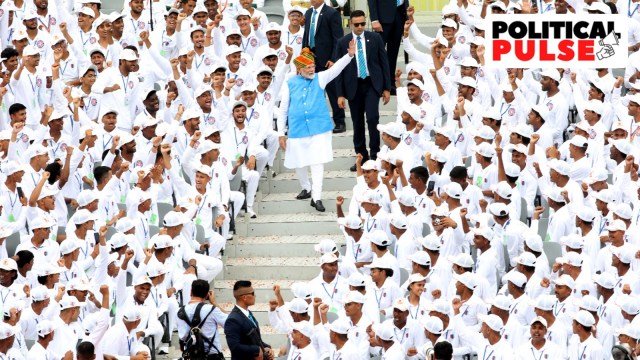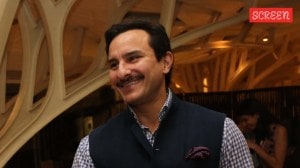PM Modi’s framing seemed to be an oblique attack on “secular” Opposition parties which have always targeted the BJP’s UCC agenda as one that springs from the party’s purported “ploy” to put the Muslim community under pressure.

It was after the Supreme Court’s Shah Bano judgment in 1985 that the BJP took up the demand for a UCC in a big way.
Shah Bano case
Protests erupted among the conservative Muslim sections when the Supreme Court in 1985 ruled that the former husband of Shah Bano, a divorced Muslim woman with five children, was obliged to keep paying Rs 179 a month to her as alimony beyond the period of three months (Iddat) as required under the Sharia laws. The then Prime Minister Rajiv Gandhi used the Congress party’s brute parliamentary majority to overturn the judgment by enacting the Muslim Women (Rights to Protection on Divorce) Act, 1986, which laid down that Section 125 of CrPC, which dealt with maintenance of women, did not apply to Muslim women.
In his autobiography, “My Country My Life”, BJP stalwart L K Advani discusses the matter at length, using the term UCC for the first time in the book in the context of the Shah Bano controversy. Recalling that Rajiv asked him before the passage of the legislation what should be done – and adding that he (Advani) replied that there was nothing to be done, as it was a sound apex court judgment – Advani says that Rajiv soon took the parliamentary route to overturn the verdict. “It was obvious, however, that far from strengthening India’s secular fabric, the government’s appeasement of the Muslim vote bank against genuine demands for gender justice had greatly weakened secularism and national integration,” Advani states in the book. During his political career he has repeatedly deployed the word “pseudo-secular” to attack the Indian parties’ secularism.
In his speech as the BJP president at the party’s National Council meeting in Delhi in May 1986, Advani criticised the overturning of the Shah Bano verdict, adding, “A wholesome byproduct of this year’s long debate on the Shah Bano judgment has been the acute awareness it has created in the country about Article 44 (UCC) of the Constitution… (and) the urgent need of reform in the Muslim personal law.”
Speaking at an event in memory of V D Savarkar in Pune, Atal Bihari Vajpayee also criticised the Rajiv government’s decision, recalling that the reformer in Savarkar made no distinction between women. The hint: the Congress made a religious distinction between women to appease powerful sections of Muslim society.
Story continues below this ad
The UCC soon became a part of a rising BJP’s core agenda, which also included the construction of the Ram Temple at Ayodhya and the abrogation of Article 370 that gave special status to Jammu and Kashmir.
With this, the UCC was turned from a constitutional vision for a gender-just reform and uniformity in personal laws to a core Hindutva agenda other parties steered clear of. That was, however, not how the UCC was seen by several members of the Constituent Assembly during 1947-50.
Constituent Assembly debates
While the British steered India towards uniform criminal laws as they brought the country under their rule, they chose not to universalise the family laws of communities, as these could become a sensitive matter.
With the Independence coming and a significant section of the leadership of the national freedom struggle being progressive, the Constituent Assembly decided to move towards uniformity in personal laws determining marriage and succession, making it clear that while rituals associated with marriage could be different for different communities and also within communities, the consequences of marriage, divorce, inheritance, etc. would converge.
Story continues below this ad
The Constituent Assembly saw a debate on the UCC on November 23, 1948. Muslim members Ismail Sahab, Naziruddin Ahmad and Pocker Sahib Bahadur raised objections to the proposal, and sought to introduce provisos saying that nothing in this Article would affect personal laws of communities, and that no interference in personal laws be made without the approval of religious communities.
The supporters of the proposal in the debate were K M Munshi, Alladi Krishnswami and B R Ambedkar. Munshi said that Muslim friends should realise that “the sooner we forget this isolationist outlook towards life, it will be better for the country”. He said that many Hindus also did not support the reform of personal laws relating to inheritance and succession as they see these as part of religion, but asked how equality for women, which was part of the Fundamental Rights, would be possible with this approach.
Refusing to accept the amendments moved to the Article by some Muslim members, Ambedkar said there were already common criminal laws and common civil laws too, except for aspects like marriage and succession. He added that the Muslim personal law had not been historically universal across India, and that till 1937, when the Muslim Personal Law (Application) Act was passed, Muslims in UP, Central Provinces and Bombay had been largely governed by Hindu laws in matters of succession.
Ambedkar then hinted at a voluntary entry into a UCC in future: “It is perfectly possible that the future Parliament may make a provision by way of making a beginning that the Code would apply only to those who make a declaration that they are prepared to be bound by it, so that in the initial stage the application of the Code may be purely voluntary.”
Story continues below this ad
Already a part of the Indian Constitution among the Directive Principles of State Policy, the UCC needs a law for it to become justiciable. Till then, it represents just a directive of the Constituent Assembly for future governments to follow. Article 44 of the Indian Constitution says that “the State shall endeavour to secure for the citizens a uniform civil code throughout the territory of India”.
Hindu Code Bill
A major complication regarding the UCC vision was that the Hindu Code Bill, meant to reform the Hindu personal laws, had been in the works through the 1940s and a large part of the 1950s, when four laws were passed to make such laws gender-just. The four laws were Hindu Marriage Act, Hindu Succession Act, Hindu Minority and Guardianship Act, and Hindu Adoptions and Maintenance Act, which applied to Hindus, Sikhs, Buddhists and Jains.
However, even as then Prime Minister Jawaharlal Nehru pushed for these laws amid opposition from conservative sections, and also from President Rajendra Prasad himself, he thought it was better to allow the Muslim community to decide within itself when it was ready for personal law reforms. This meant that the Hindu Code Bill led to four reformed laws, but the Muslim personal law was not reformed, which was contrary to the constitutional vision behind a UCC.
Recent decades
The BJP put its core agenda on the backburner when the party-led NDA under Vajpayee’s leadership came to power from 1998 to 2004, in order not to alienate allies who had their Muslim support base too.
Story continues below this ad
By this time, the demand for a UCC had changed its political meaning. Between 1947 and 1950, it was seen as an attempt to usher in uniform gender reforms, but from the late 1980s it became a Hindutva demand and was seen in non-BJP circles as a “ploy to trouble the minority community”.
During the first two terms of the Modi government, the Ram Temple has come up in Ayodhya while Article 370 has also been scrapped. The UCC
is the last unfulfilled ideological agenda of the BJP for now, and PM Modi threw a clear hint in this Independence Day speech that he would look to implement it. He, however, chose to frame it as a “secular civil code” to indicate that the Opposition not being on the same page as the BJP over it was a sign that its secular claims might be a smokescreen for “appeasement politics”.
The UCC demand was raked up by the BJP afresh after the Supreme Court struck down instant triple talaq in 2017. The BJP-led Uttarakhand government has already enacted the legislation to implement the UCC, with some other party-ruled states expected to follow suit. It is to be seen how the BJP-led central government 3.0, which depends critically on NDA allies like the TDP and the JD(U), tackles the issue now, with PM himself making a statement of intent on this Independence Day.

































